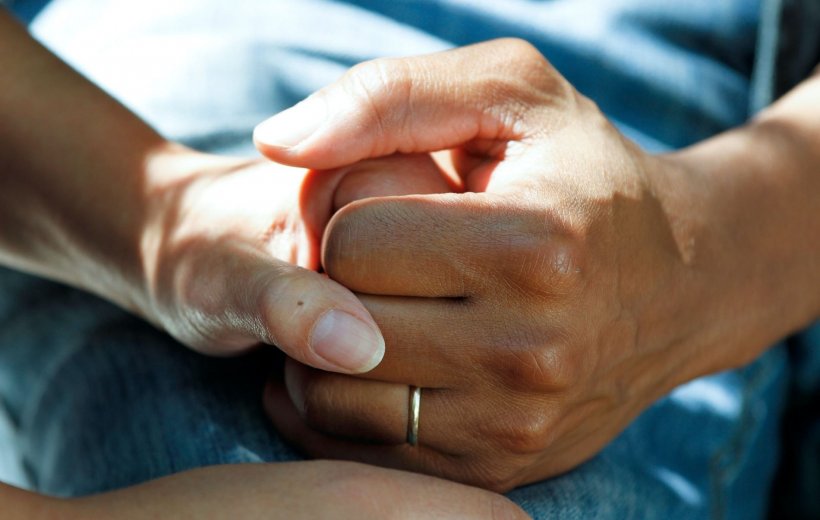
Image source: Unsplash/National Cancer Institute
News • Role of end-of-life support
Covid-19: a 'stress-test' for palliative care
A new report shows how palliative and end of life care in the UK was compromised by shortages of PPE, essential medicines, and equipment, because these services were not seen as ‘frontline NHS’ in the pandemic.
Better End of Life – a collaboration between Marie Curie, Hull York Medical School, University of Hull, King’s College London Cicely Saunders Institute, and the University of Cambridge – is a new research programme that will examine evidence on the current state of dying, death and bereavement across the four nations of the UK and propose a policy agenda aimed at helping to ensure that everyone has the best possible end of life experience. The report, which launches the programme and is available on the Maie Curie website (PDF), is the first comprehensive review of dying, death and bereavement during Covid-19 and highlights valuable lessons for the long-term future of palliative and end of life care and bereavement support in the UK.
It is essential that we learn from the achievements and weaknesses in care that the pandemic has exposed, to improve future provision of palliative, end of life and bereavement care
Katherine Sleeman
Co-researcher Professor Fliss Murtagh, Professor of Palliative Care, Hull York Medical School, and Associate Director of the Wolfson Palliative Care Research Centre, University of Hull, said: “While hospital and care homes deaths have increased during the pandemic waves, home deaths have increased throughout all of the last twelve months, even between the waves. Home-based services have therefore had to provide more support for people dying at home and their families, over the last year.”
Professor Katherine Sleeman from King’s College London and lead researcher on the report, said: “The Covid-19 pandemic accelerated the need for palliative and end of life care in the UK. However, the experiences of those affected by dying, death and bereavement – whether as a result of Covid-19 or other conditions – have had little scrutiny to date. It is essential that we learn from the achievements and weaknesses in care that the pandemic has exposed, to improve future provision of palliative, end of life and bereavement care.”
The report says more needs to be done to understand the care people did and didn’t receive, to ensure that the whole system is ready for the increased number of people dying in the future, which is projected to be 100,000 more people a year across the UK in 20 years. In 2020, the number of people who died was just over 695,000 – an increase of 91,000 on the previous five-year average (604,000). There has also been a large increase in deaths at home – the overwhelming majority of which were from causes other than Covid-19. Experts warn that the last year has been a stress-test for community-based palliative care, in homes and care homes.
Recommended article

Article • New concept 'HeiMeKOM'
Involvement of patients and relatives improves cancer communication
The Heidelberg Thorax Clinic is trialling a newly structured, longitudinal communication concept to meet proactively the complex needs of stage IV lung cancer patients and their relatives. The concept is aimed at enhancing prognostic understanding and building the basis for proactive care planning, early integration of palliative care and shared decision-making, ultimately improving overall care.
Dr Stephen Barclay, a GP and Consultant in Palliative Care from the Department of Public Health and Primary Care at the University of Cambridge, and co-researcher, said: “General Practitioners, Community Nurses and Care Home staff have all been at the front line of end of life care during the pandemic. There is a pressing need for their central role in caring for people at the end of their lives to be recognised, supported and adequately resourced.”
The Better End of Life 2021 report contains unpublished UK data from CovPall – a study of the role and response of palliative care and hospice services to the Covid-19 pandemic – it shows that palliative care teams in all settings were stretched to and beyond capacity, but proved a vital component to the emergency pandemic response. However, too often, the ability of palliative care services to provide vital care and support was undermined by failing to be treated as a frontline NHS service. Professor Sleeman said: “The data show that hospice and palliative care teams had problems accessing supplies, partly because they felt they were not recognised as part of NHS supply chains.”
There is pressing need to develop bereavement support to address this ‘tsunami of grief’
Stephen Barclay
Primary care services also delivered more palliative and end of life care, with GPs and district nurses increasing their support for people dying at home. However, community and home-based care was particularly stretched, meaning people may not have been able to access the support they needed. At the same time, slogans such as ‘stay at home, protect the NHS’ may have discouraged people with life-limiting illnesses to seek hospital care when they needed it.
The researchers highlight that societal preferences and expectations for death and dying may have permanently changed, and if so, that new models of delivering palliative and end of life care in the community would be needed to reduce pressures on the NHS and ensure dying people are supported to die well at home. Attention is also needed to ensuring carers and family members do not become overwhelmed, as many have done during the pandemic. Greater support for those affected by bereavement and complicated grief during the pandemic is also urgently needed. Dr Barclay said: “Bereavement has been a much more difficult experience for people during the pandemic, whether loved ones died from Covid-19, died from non-Covid conditions, or were bereaved before the pandemic. There is pressing need to develop bereavement support to address this ‘tsunami of grief’.”
Alongside the Better End of Life report, a new survey of bereaved carers, by Marie Curie and conducted in partnership with data and insights provider Dynata, showed that three quarters of people who died at home during the pandemic may not have got all the health and social care they needed. Carers also shared that they took on more emotional burdens when caring for their dying loved one, yet three out of four of all respondents felt they were not offered all the care and support they needed as carers.
In light of the new report, end of life charity Marie Curie is calling for a long-term settlement to ensure end of life care is sustainably funded, with a particular emphasis on ensuring people dying at home, and their carers, always receive the support they need. Marie Curie Chief Executive Matthew Reed, said: “Many people will not be able to forget the deaths we have experienced this last year, but it is crucial that the lessons learned during the pandemic are applied to policy and practice in ways that help ensure that, in future, everyone has the best possible end of life care and experience. Palliative and end of life care must be an essential part of the health and social care system and not a forgotten after-thought. Hospitals and care homes have rightly had a focus in the pandemic but the Better End of Life 2021 Research Report shows us that many in our society fall through the cracks when they need support at the end of life. How the dying spend their final days lives on in the memory of the people who love them. It is true that most people would choose to die at home, but no one should be allowed to die in pain and without the essential care they need. Today, we are calling for a long-term settlement to make sure end of life care is sustainably funded, with a particular emphasis on ensuring people dying at home always receive the support they need. The Better End of Life research programme has never been more needed. In the coming years it will help national and local decisionmakers across the UK have the evidence they need to improve end of life experience for all.”
Source: Hull York Medical School
08.04.2021











